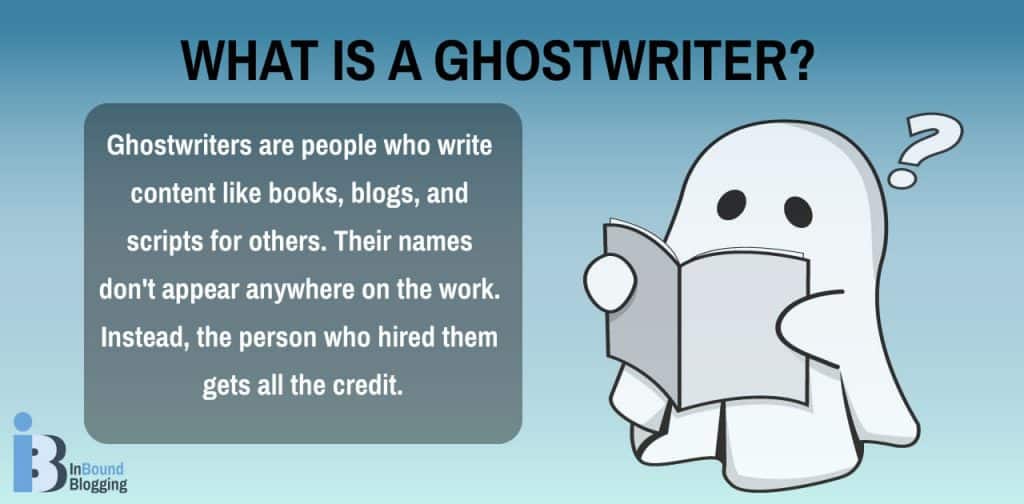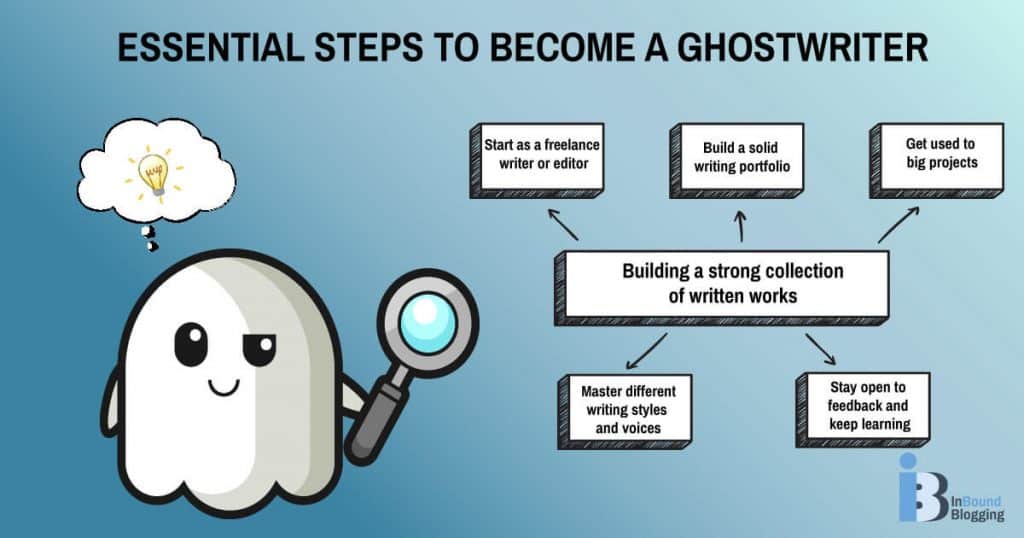Interested in learning how to become a ghostwriter? Look no further.
Ghostwriters are the unsung heroes behind the scenes, crafting everything from novels to blog articles while remaining invisible to the public eye. Their earnings can range from a few thousand dollars to more than $100,000 per project.
In this guide, I’ll talk about creating an impressive portfolio, securing your first assignments, and adapting to various writing styles. I’ll also debunk some common myths about ghostwriting.
Are you ready to embark on your ghostwriting journey? Let’s get started.
Becoming a Ghostwriter [Key Takeaways]
- Ghostwriters write for others and don’t get credit. They can work on books, blogs, or scripts. Good ghostwriting matches the client’s style.
- Build a writing portfolio with various styles and topics. Get started as a freelance writer or become a freelance editor to gain experience. The ability to handle big projects well is important.
- You can find ghostwriting jobs online on platforms like Upwork and Freelancer.com, through personal networks, or on special job boards and agencies.
- Ghostwriters earn from $2,000 to over $100,000 per project, depending on the work’s size and the time frame of the client.
- There is a high demand for ghostwriters who can adapt their writing style. Versatility in writing increases the chances for bigger projects and better pay.
What Is a Ghostwriter?

Ghostwriters are people who write content like books, blogs, and scripts for others. Their names don’t appear anywhere on the work. Instead, the person who hired them gets all the credit. It’s all legal as long as everyone agrees that the one paying for the writing owns the full rights to it in the end.
Ghostwriting is more about being good with words. You need to bring someone else’s ideas to life in a style that sounds just like them, not you.
That means writing anything from a music album to a business book, each time switching how you write to match the client’s voice. Some projects might pay around $2,000, but if you land a gig with someone very well-known or end up working on a huge project, your paycheck could hit six figures.
How to Become a Ghostwriter: Essential Steps

To kick off your ghostwriting journey, focus on building a strong collection of written works. Jump into the freelance world and start taking on tasks as a writer or editor to get your feet wet.
Step 1: Start as a freelance writer or editor
Jumping into freelance writing or editing is a great way to gain experience and grow your skills. Sites like Upwork and Freelancer.com are great places to find ghostwriting gigs. Reach out to your network; you might land editing or writing jobs with people you already know. Freelance writing and editing teach you how to work with clients, which is a big part of ghostwriting.
Step 2: Build a solid writing portfolio
Show off a variety of work, whether it’s blog posts, articles, or book excerpts. Mix in short and long pieces (even up to 50,000 words) to prove you can keep the same voice throughout big projects. Don’t forget to include different styles and topics—from search engine optimization (SEO) content to personal stories—to show you’re adaptable.
For example, you may be wondering how to become a music ghostwriter. In that case, your portfolio should include sample lyrics and music-related writing to demonstrate your expertise in the music field.
Step 3: Get used to big projects
Taking on bigger projects like novellas or long essays is a key step for ghostwriters. You’ll learn how to organize complex ideas and stay consistent over lots of pages. It’s also about learning how to adapt your style to match what your clients are looking for—whether they’re business owners or authors.
Step 4: Master different writing styles and voices
Being a successful ghostwriter means you need to be able to switch up your writing style and voice. That requires having an extensive vocabulary and an active imagination. The most effective way to achieve these is through reading, and I mean a lot of reading—paperback and hardcover books, online content, etc. You have to get into the client’s head and capture their tone of voice.
Whether it’s health blogs, corporate speeches, or lifestyle articles, the challenge is to keep your personal style out and ghostwrite in a way that feels authentic and matches the client’s style.
Step 5: Stay open to feedback and keep learning
Feedback is your best friend as a ghostwriter. Every project helps you learn something new, and client input helps you get better at matching their voice. Keep trying out new genres and writing styles to build your skills and stay flexible for future clients.
Earnings Potential for Ghostwriting
Ghostwriters earn a range of income, from $20,000 up to $100,000+ annually. Some even earn up to six figures for bigger tasks. At the start, gaining experience matters more than big paychecks.
Demand for ghostwriters
I’ve seen firsthand how the demand for professional ghostwriting has grown. More people hire ghostwriters to share their stories—from business leaders in need of thought leadership articles to best-selling authors.
They need ghostwriters who can capture their voice and message clearly. I’ve noticed this trend on platforms like Upwork and through direct connections in my network. It’s a busy market.
“Companies are always looking for clear, well-researched materials to upskill their teams. Writing eBooks, training manuals, and instructional content for businesses can be highly profitable,” says Christopher Pappas, the founder of eLearningIndustry.com.
Writers who can adapt quickly to different writing styles are especially sought after. Whether it’s crafting captivating social media posts or detailed, wordy books, being versatile is paramount.
Most profitable niches for ghostwriting
The most lucrative writing niche for ghostwriters often depends on market demand, the client’s profile, and the complexity of the project. However, several niches are particularly well-known for their high earning potential:
- Celebrity biographies: Writing memoirs for celebrities or high-profile figures can pay well, thanks to the prestige and deep research involved.
- Business leadership books: Ghostwriting for executives looking to build their brand or share their expertise is a high-paying niche.
- Self-help and personal development: This genre appeals to a wide audience, making it a solid choice for ghostwriters.
- Health and wellness: Projects for nutritionists or wellness experts often require detailed research, which can lead to higher fees.
- Fiction for established authors: Collaborating with well-known authors or writing in popular genres like thrillers or romance can be very lucrative.
Each of these niches involves different levels of complexity, research, and client interaction, which can influence your compensation. Specialized projects tend to command higher fees due to the expertise required and the potential impact on the client’s brand or career.
Where to Find Ghostwriting Jobs
Looking for ghostwriting jobs? The hunt might seem tough, but there are plenty of spots to check out.
- Freelance platforms: Use sites like Upwork, Fiverr, and Freelancer.com to find ghostwriting gigs. Bidding on projects helps you build your reputation and, with consistent quality, land repeat ghostwriting clients and long-term work.
- Leverage your network: Reach out to personal contacts and existing clients for ghostwriting opportunities. These trusted connections often lead to new gigs and referrals, making it easier to build your reputation. Furthermore, Mohan Babu, the Savings Specialist at Dealhack, claims that “targeted cold outreach, including emails to potential clients or publishers, is still a highly effective strategy.”
- Job boards and agencies: Check out niche job boards and ghostwriting agencies for specialized gigs. Agencies also help with proposals and contracts, so you can focus on writing and developing your ghostwriting business instead of finding projects.
Become a Successful Ghostwriter: Tips and Hacks

Looking to make it big as a ghostwriter? Here are some tips and tricks to help you stand out and get noticed.
- Offer a free sample: Try giving away a free sample of your work to attract clients. Whether it’s a short piece or a chapter, letting potential clients see your writing firsthand can boost your chances of landing a gig.
- Build a brand: Set yourself apart by creating a personal brand. Start with a professional website and get active on social media. Share writing tips, behind-the-scenes looks at ghostwriting, and your success stories to build your reputation.
- Invest in writing tools: Boost your writing game with some advanced AI writing tools. Grammarly, Hemingway, and Scrivener can help polish your work, manage complex projects, and streamline your writing process.
- Understand industry trends: Keep up with industry trends and hot topics. Being in the know about what’s current can make you a more appealing choice for ghostwriting projects, especially in specialized fields like tech or finance.
Finally, Vaibhav Kakkar, the CEO of Digital Web Solutions, shares that understanding SEO is a must for success:
“Ghostwriters need to know how to seamlessly incorporate keywords into content without sacrificing readability. Strong research skills are also a must, as content often spans various industries.”
Ghostwriting Myths Debunked
Ghostwriting is often surrounded by myths that can lead to misunderstandings about the profession. Here are some common myths debunked:
Myth 1: Ghostwriters do all the work without any recognition
Reality: Even though ghostwriters usually don’t get their names on the work they do, they often get recognized in private or professional circles. In addition, a lot of ghostwriters build their reputation through referrals and networking. This can open doors to more gigs and bigger projects.
Myth 2: Ghostwriting is just for famous people
Reality: Ghostwriting isn’t just for celebrities or big names. Lots of ghostwriters work with business executives, experts, and regular folks who want to publish a book or create content but don’t have the time or skills to do it themselves.
Myth 3: Ghostwriters only write books
Reality: Ghostwriters do much more than just write books. They work on texts like articles, landing pages, blog posts, speeches, business reports, and even scripts. Basically, they adapt to whatever writing needs come their way.
Myth 4: Ghostwriting is easy and doesn’t require much skill
Reality: Ghostwriting is a challenging job. You need to be a strong writer who can adapt to different styles, do thorough research, and maintain confidentiality. It’s all about collaborating with the client to really understand and bring their vision to life.
Myth 5: Ghostwriters are just “hired hands”
Reality: In fact, their contribution is key in shaping the content and finding the client’s voice. They often help guide the direction of the content, too. It takes a lot of creativity, strategic thinking, and a solid grasp of the topic.
Myth 6: Ghostwriters are always paid per word or project
Reality: Payments for ghostwriters can differ. Some get paid per word or project, while others might have a retainer or earn a percentage of the royalties from a book. It all depends on the project’s size, the client, and the ghostwriter’s experience.
Myth 7: Ghostwriting is a dishonest profession
Reality: Ghostwriting is a normal part of the publishing world. Clients and ghostwriters usually work out the details, including the fact that the ghostwriter won’t get public credit. It’s a professional service that helps people and groups get their ideas across effectively.
Understanding these realities lets us appreciate the hard work and talent that go into ghostwriting and just how much value ghostwriters bring to their clients.
Conclusion
Becoming a ghostwriter takes work, but it’s doable. You need to read a lot and write even more. Show off your best pieces in a portfolio. Start by writing short content for others. Then, tackle bigger projects like long articles or books.
Get used to writing how someone else sounds; it’s key for this job. Look for gigs on websites or through people you know. With effort, you can make it in the ghostwriting world—helping bring others’ stories to life while staying behind the scenes.
FAQ
What should I know about making my way in the market for ghostwriters?
The hardest part when starting is building up your portfolio and establishing trust with potential clients. But don’t worry; there’s no shortage of work once you get going. You’ll probably find that people love having someone else take care of their content creation needs so they can focus on other aspects of their business.
How do I market myself as a ghostwriter on LinkedIn?
To become a LinkedIn ghostwriter, create a professional profile and pitch your writing skills, experience, and any ghostwritten works. Engage with relevant content, join groups, and connect with authors, influencers, and entrepreneurs to expand your network.
What is the process for ghostwriting a book?
The process for ghostwriting a book typically involves meeting with the author to discuss their vision, conducting research, drafting content, revising based on feedback, and finalizing the manuscript. It’s a lengthy and detailed step-by-step process that requires good communication.
Do all successful ghostwriters get credit for their work through acknowledgments or bylines?
Not always. Some clients will give credit, while others prefer to keep things confidential due to personal reasons or industry norms. However, successful writers don’t let this deter them from providing top-notch ghostwriting services and maintaining professionalism at all times.
What are some famous ghostwriting examples?
Famous examples of ghostwriting include Barack Obama’s memoir “A Promised Land,” Donald Trump’s “The Art of the Deal” by Tony Schwartz, most of Elton John’s lyrics by Bernie Taupin, and James Patterson’s numerous novels co-authored with ghostwriters.



